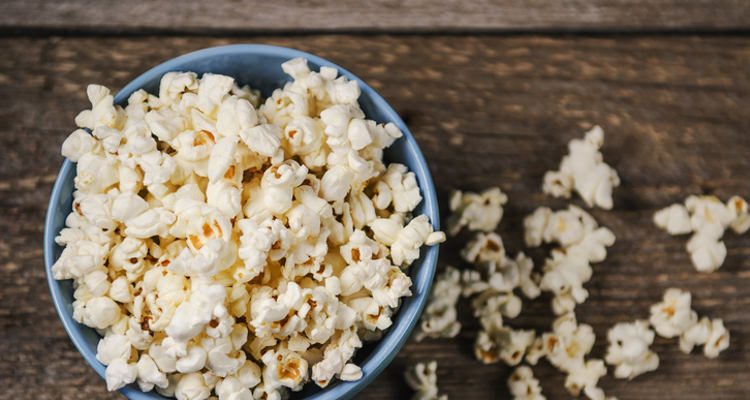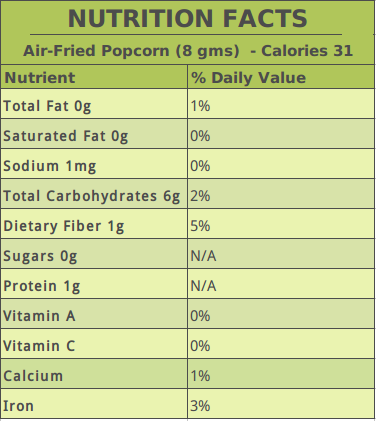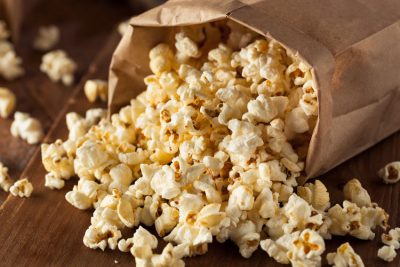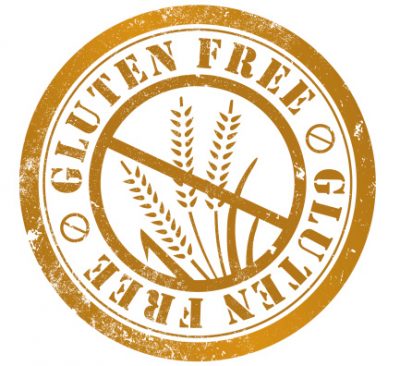
Popcorn easily fills a void at the movies, or any time of the day. In general, popcorn is thought to be a healthier alternative to potato chips, cookies, and other snacks. Where does popcorn even come from? The answer is definitely not the microwave (more on that later…). But there’s a lot of debate around that, is popcorn fattening or not?
To know if popcorn is actually fattening or it’s just a myth, we need to study it’s nutritional content.
Nutrition Facts and Calories of Popcorn
Does that “pop” lead to an explosion of popcorn health benefits? According to SELF Nutrition Data, a cup of popcorn or 11g (regular flavor) contains 64 calories, 1g each of dietary fiber and protein, and 5g each of carbs.
Popcorn is also low in cholesterol and contains good fats or poly and mono unsaturated fatty acids and omega-3 and -6 fatty acids. It contains trace amounts of vitamin A, alpha and beta carotene, lutein, vitamin E, niacin, folate, and choline.
It contains minerals such as phosphorus, potassium, sodium, and traces of zinc, calcium, manganese, and selenium.
Nutritional Contents of Plain White Air-Fried Popcorn
Let’s take a deeper look at the plain white air popped popcorn nutrition facts. The following is a comprehensive nutrition chart for one cup of white, air-popped popcorn. Air-popped popcorn is one of the healthiest ways to prepare popcorn because it doesn’t involve oil.
Popcorn Nutrition Chart
Keep in mind, though, that many people will double and even triple this nutrition chart while at the movie theater. Eating it in moderation is the key.
Is Popcorn Fattening?
As we mentioned earlier, popcorn is not fattening because it doesn’t contain a lot of calories. The problem is that, by itself, popcorn tends to be rather bland. As a result, many people add salt, butter, and other flavoring to popcorn, which, needless to say, increases the fat and calories of popcorn.
Although salt is necessary to control the balance of body fluids in the body, excessive intake of sodium chloride leads to hypertension, water retention, obesity, and puts pressure on kidneys to remove the excess salts through urine.
3 Methods of Making Popcorn Along With Their Ill Effects and Benefits
The packaged corn we get in retail stores is often not healthy because of salts, oils, sugars, which means you further increase your calorie count. Let’s take a brief look at the three ways popcorn is made.
1. Microwave (Popcorn Bags):
Microwaved popcorn is definite no-no, and the reason has more to do with the popcorn bag than the calories of the popcorn.
Microwave popcorn calories will vary based on the size and amount of butter, or butter flavor rather, inside the microwave popcorn bag, but more often than not, they are likely to be fattening.
It can contain up to 400 calories per bag or more. However, the lining of the microwave popcorn bag is coated with a substance that when heated produces perfluorooctanoic acid—also known as PFOA, which is thought to be a carcinogen capable of causing cancer.
And that’s not all, folks. You can get “popcorn worker’s lung,” which is a respiratory disease reported in people working in factories where microwave popcorn is created.
Popcorn worker’s lung is caused through the inhalation of another dangerous chemical called diacetyl, which is used for making the fake butter flavoring in microwaved popcorn. Yeah, so no microwaved popcorn.
2. Stove Top:
Luckily, making popcorn on the stove avoids some of the carcinogenic ingredients and other problems associated with microwaved popcorn.
However, you will need to use some oil to prevent the bottom of the pan from burning. So, that little amount of oil may add up a few calories.
But, this is far better and healthier than eating packaged popcorn because for mug full of kernels, you might need just a teaspoon of oil. Also, you can use some healthy oils such as olive, avocado, or coconut oil.
3. Air Popper:
An air popper is considered the healthiest way to make popcorn. It reduces the amount of fat needed to make popcorn at home.
An air popper doesn’t require oil because it keeps air flowing around the kernels, which prevents them from burning. Air poppers will spin raw popcorn kernels in a central chamber. Once the kernel has popped, the popcorn will travel through a chute and land in a bowl.
Also, some air poppers may contain a special compartment with added seasonings or melting butter, which, of course, you don’t need to use. A cup of air-popped popcorn will contain around 30 calories.
But the average person will likely consume a few cups minimum per sitting. That said, you will still wind up with less than 200 calories, which is a lot fewer than the other methods of popcorn cooking.
Is Popcorn Healthy?
The answer is yes. In its purest form, popcorn is absolutely healthy. It does become unhealthy when loaded with salts, sugars, flavorings, and additives.
So, the nutrition value of popcorn depends a lot on the way it is made and the ingredients added. Avoid buying packets of microwave corn and the ones that are processed and packaged with various flavorings, butter, cheese, and so on.
The best way to retain the goodness of corn is make them at home, and it’s pretty simple! All you need to do is buy some plain, dried corn kernels from a nearby store and pop them using an air popper or a stove top.
How to Make Healthy Popcorn at Home
Most varieties of microwaved and pre-popped popcorn are often overloaded with chemicals and other toxic ingredients. Even at the movies, the popcorn ingredients are frequently full of fat and chemicals, while the popcorn itself is likely genetically modified.
However, going to the movies or watching movies at home likely wouldn’t be the same without popcorn. In fact, popcorn was even being popped and eaten 7,000 years ago in Peru. So, if you want healthy popcorn, what’s the solution? Basically, you must pop it yourself using a limited amount of healthy oil and a stove top, or an air popper and no oil. It is affordable, too.
Think of popcorn as a treat for watching a movie with your kids, and not a regular part of your lunch at work. With this in mind, popcorn can be enjoyed as a sensible snack in your balanced diet. Homemade popcorn made on a stove top or air popper machine is definitely healthier than microwaved popcorn. However, not everyone can afford an air popper machine.
Simple Stove: Top Recipe to Make Healthy Popcorn at Home
The following is an easy healthy stove top popcorn recipe with turmeric and sea salt you can try. The recipe will yield four to five cups of popcorn, and it is vegan, dairy-free, and gluten-free.
It will definitely replace the unhealthy microwaved popcorn bag, and it even stores for up to one week in a sealed container.
Ingredients:
- 3 tbsp. of coconut oil
- 1/2 cup of organic popcorn kernels
- 1/2 tsp. of Celtic gray sea salt
- 1/2 tsp. of turmeric powder
- Ground black pepper to taste
Directions:
- In a medium saucepan over medium-high heat, heat the coconut oil, and add the popcorn kernels. Cover the pan and shake it every now and then, until you hear the kernels begin to pop. Also, do not let the pan sit on the hot element for more than five to 10 seconds at a time once the kernels begin to pop. At this time, lift the pan and shake it.
- Remove the popcorn from the heat once you no longer hear any popping. Pour the popcorn into a large bowl, and mix in salt, turmeric, and pepper to taste. The popcorn is ready to be munched on!
- Alternatively, to spread the flavor more evenly, you can add turmeric powder, salt, and pepper immediately after you add the kernels in oil and then let them pop.
Besides the turmeric-salt popcorn recipe, there are also a variety of other spice combinations you can try to make your popcorn healthy.
For instance, chili powder and paprika gives your popcorn a little spice, lemon pepper adds a little zest, while basil, oregano, and parsley adds some healthy herbs to the mix. Also, cinnamon and grated nutmeg can add a little sweetness to your popcorn.
Popcorn Health Benefits
Now, we know for sure that popcorn if made and eaten the healthy way is not fattening. So, are there any health benefits of popcorn? Yes popcorn has quite a few health benefits and is definitely a healthy snack if made in the right way and eaten in moderation.
As mentioned, popcorn does contain some important nutrients like manganese, magnesium, phosphorus, and zinc. Popcorn is also packed with protein. These are some popcorn health benefits to keep in mind.
1. Low-Calorie Snack
Air popped popcorn can be a low-calorie snack that is helpful for weight loss. You can enjoy it as an evening snack if made in the right way and need not worry about calories. Make sure you eat in moderation.
2. Gluten-Free:
Many snacks contain gluten, especially crackers, cookies, and surprisingly most potato chips brands. Luckily, corn, including popcorn, is a gluten-free snack alternative. This can be useful for many people on a gluten-free diet.
3. Good Source of Fiber:
Four cups of popcorn will contain nearly 5 g of fiber, and most Americans don’t consume enough fiber at all. The general recommendation of fiber is 25 g for women and 38 g for men.
Adequate fiber intake aids digestion, and in a way boosts metabolism. It may also lower your risk of heart disease and type 2 diabetes.
4. High in Antioxidants:
In a 2012 study, Pennsylvania’s University of Scranton researchers found that the antioxidant concentration in popcorn is actually higher than once thought.
The study found that the antioxidant polyphenol concentration in popcorn was greater than most fruit. The polyphenol is found within the hull of popcorn, and popcorn without the hull may see less antioxidant concentration.
Polyphenols possess lots of health benefits, and can help prevent diseases like heart disease, osteoporosis, neurodegenerative diseases, diabetes, and cancer.
In summary, popcorn can be healthy, but it just as easily can be unhealthy too. Remember to throw away your microwave popcorn bags, and try making your own on a stove top or with an air popper machine. It also matters a lot how you season your popcorn snack.
Also, remember to eat in moderation and enjoy your popcorn with your family or friends.
Related:
- Cleanse Drinks: 10 Detox Drink Recipes for Effective Cleansing
- Strawberry Detox Water: Health Benefits & Recipes
- Cranberry Juice Detox: How to Use Cranberry Juice for Detox
Sources:
“Snacks, popcorn, air-popped, white popcorn Nutrition Facts & Calories,” SELFNutritionData website; http://nutritiondata.self.com/facts/snacks/5659/2, last accessed Jan. 25, 2017.
“Is Air Popped Popcorn Healthy?” SFGate website; http://healthyeating.sfgate.com/air-popped-popcorn-healthy-3550.html, last accessed Jan. 25, 2017.
“Is popcorn fattening or good for weight loss?” Health Someness website; http://www.healthsomeness.com/popcorn-weight-loss/, last accessed Jan. 25, 2017.
McCarthy, J., Joyous Health: Eat and Live Well Without Dieting (Toronto: Penguin Group, 2014), 74, 212.
Gunnars, K., “6 Reasons Why Vegetable Oils Can be Harmful,” Authority Nutrition website; https://authoritynutrition.com/6-reasons-why-vegetable-oils-are-toxic/, last accessed Jan. 25, 2017.
“How Should Popcorn Be Served to Make It a Healthy Snack?” SFGate website; http://healthyeating.sfgate.com/should-popcorn-served-make-healthy-snack-6192.html, last accessed Jan. 25, 2017.
















